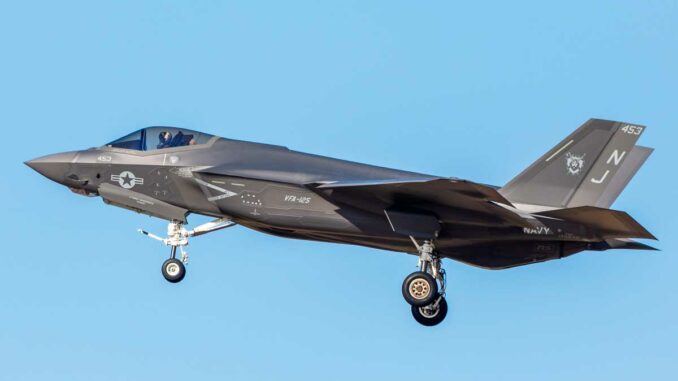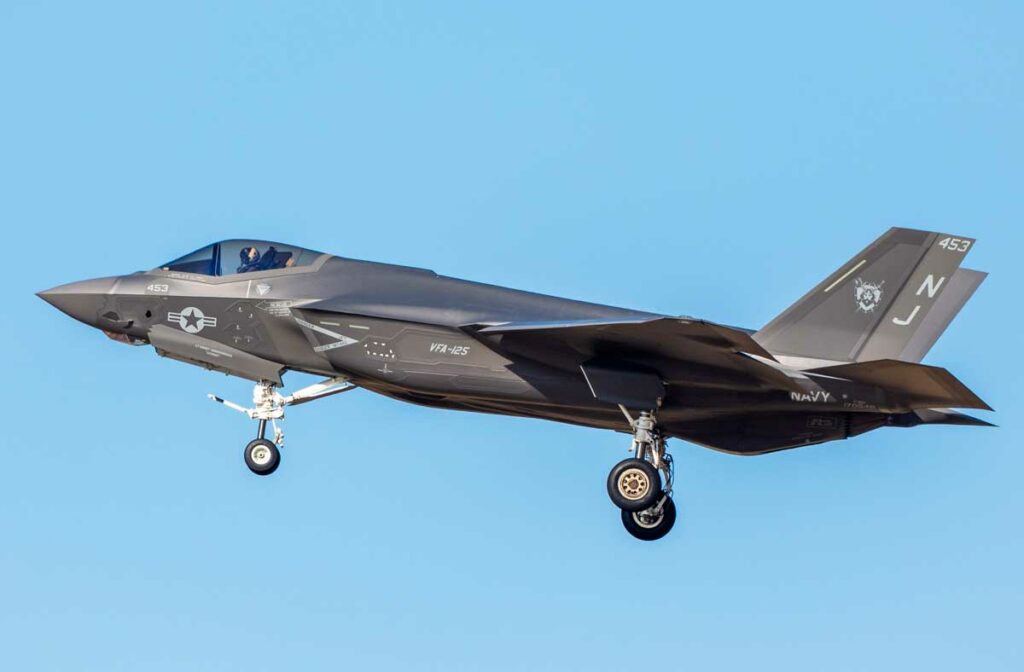
Faced with Donald Trump’s protectionist push, Spain has canceled its purchase, Switzerland is reevaluating despite the 39% tax, and India has suspended its acquisitions.
The immediate impact of the US protectionist push
The protectionist push led by Donald Trump has introduced aggressive tariffs on several of the US’s trading partners. These measures have triggered a series of political and military reactions, particularly around F-35 orders. In the eyes of its allies, these measures reflect a questioning of US strategic reliability, with repercussions for F-35 orders. Spain, Switzerland, and India are the most notable examples.
Spain ends its project: cancellation of Spain’s F-35 order
Spain has canceled its planned acquisition of F-35s. It is now turning to regional solutions: Eurofighter Typhoon jets first, followed by the Franco-German Future Combat Air System (FCAS). This decision reflects its commitment to acquiring European fighter jets to strengthen its industrial and strategic autonomy.
The Spanish government has announced that 87% of its defense budget increase—a major portion of the additional $12 billion—will be allocated to European industry. This disengagement marks a clear break with the influence of customs tariffs on F-35 sales and underscores the quest for European fighter jet competition to the F-35.
Switzerland between economic awareness and strategic choice: the reevaluation of Switzerland’s purchase of F-35s
In Switzerland, the imposition of a 39% tax on F-35s has triggered a reevaluation of Switzerland’s purchase of F-35s. The initial contract, signed in 2021, provides for the acquisition of 36 aircraft for approximately 6 billion Swiss francs (≈ 7.38 billion dollars).
A resolution discussed in Parliament proposes abandoning this program and favoring European aircraft. Both the left and right wings of the opposition are pushing for this option in light of the economic and symbolic shock represented by the protectionist measures on US defense.
However, Federal Council President Karin Keller-Sutter has stated that Switzerland is sticking to its plan, arguing that abandoning it would weaken its air defense. She is hoping to secure a more favorable agreement despite the pressure. The final decision is expected in the coming months, by November at the latest, when the budget review will be examined.
India faces tariff turmoil: potential suspension of India’s purchase of F-35s
India has entered into a trade war with the United States. The US has raised tariffs on certain Indian products to 50% in response to Russian energy imports.
This escalation has led to a pause in discussions on several defense acquisitions, ranging from Stryker combat vehicles to Javelin missiles and certain Boeing aircraft. Reports suggest that India has suspended its purchases of US weapons, including potentially the F-35.
However, the Indian government has strongly denied these claims, assuring that defense purchases remain “on track” and that no changes have been decided. While New Delhi affirms its desire to maintain strategic exchanges, it also communicates a strong desire for mutual respect, alongside a willingness to develop autonomy through the “Make in India” and “Aatmanirbharta” programs.

Comparative analysis: why are these repercussions appearing now?
Political pressure and loss of confidence
The reaction of the United States’ allies to protectionist measures reflects a global disenchantment. These governments believe that the stability and predictability expected in strategic relations are under threat.
Sovereignty and regional industrial development
Spain and other countries (Portugal, Canada, Canada, Portugal mentioned) see European production as a response to US instability. The future of the F-35 program in the face of US protectionism is now increasingly uncertain.
Cost of the F-35 program and dependence on export sales
The F-35 is an economic pillar: 25-30% of Lockheed Martin’s revenue (≈$72 billion annually) depends on exports. A decline in orders could weaken the entire production chain and increase unit costs.
Overall strategic readjustment
India is reaffirming its multi-vector strategy: maintaining ties with the United States while promoting its technological sovereignty. Spain and Switzerland are redefining their defense policies around the concept of local and European control.
Key figures and data
- Spain is abandoning planned military spending worth several billion, reallocating most of its budget (87% of +$12 billion) to European industry.
- Switzerland has placed an order for 36 F-35s worth more than 6 billion Swiss francs (≈ 7.38 billion dollars) and faces a 39% tax on Swiss exports from the United States.
- India is exposed to tariffs of up to 50% on its exports to the United States.
- The F-35 program generates approximately $72 billion per year and accounts for a quarter to a third of Lockheed Martin’s revenue.
- Annual production of the F-35 is around 156 units per year, with more than 1,100 aircraft delivered to date.
Strategic outlook: towards a new global defense landscape
The decisions taken by Spain, Switzerland, and India illustrate growing tensions between US trade policy and traditional defense relations. The military aviation industry is seeing the emergence of a diversification dynamic. Countries are reconsidering their partnerships in terms of both political and technical viability.
The crisis reveals that the future of the F-35 program in the face of US protectionism is at stake. The model whereby allies purchase US systems on a massive scale is becoming fragile. This could lead to increased competition from European fighter jets, notably via the FCAS or the Eurofighter, while other countries could turn to domestically produced models or multiparty partnerships.
It is clear that US trade policy and its effects on defense are no longer separable. This new reality requires a reinvention of strategic alliances. Efforts toward greater industrial autonomy and diversification of military equipment sources are becoming essential to ensure reliability, stability, and modernity.
War Wings Daily is an independant magazine.